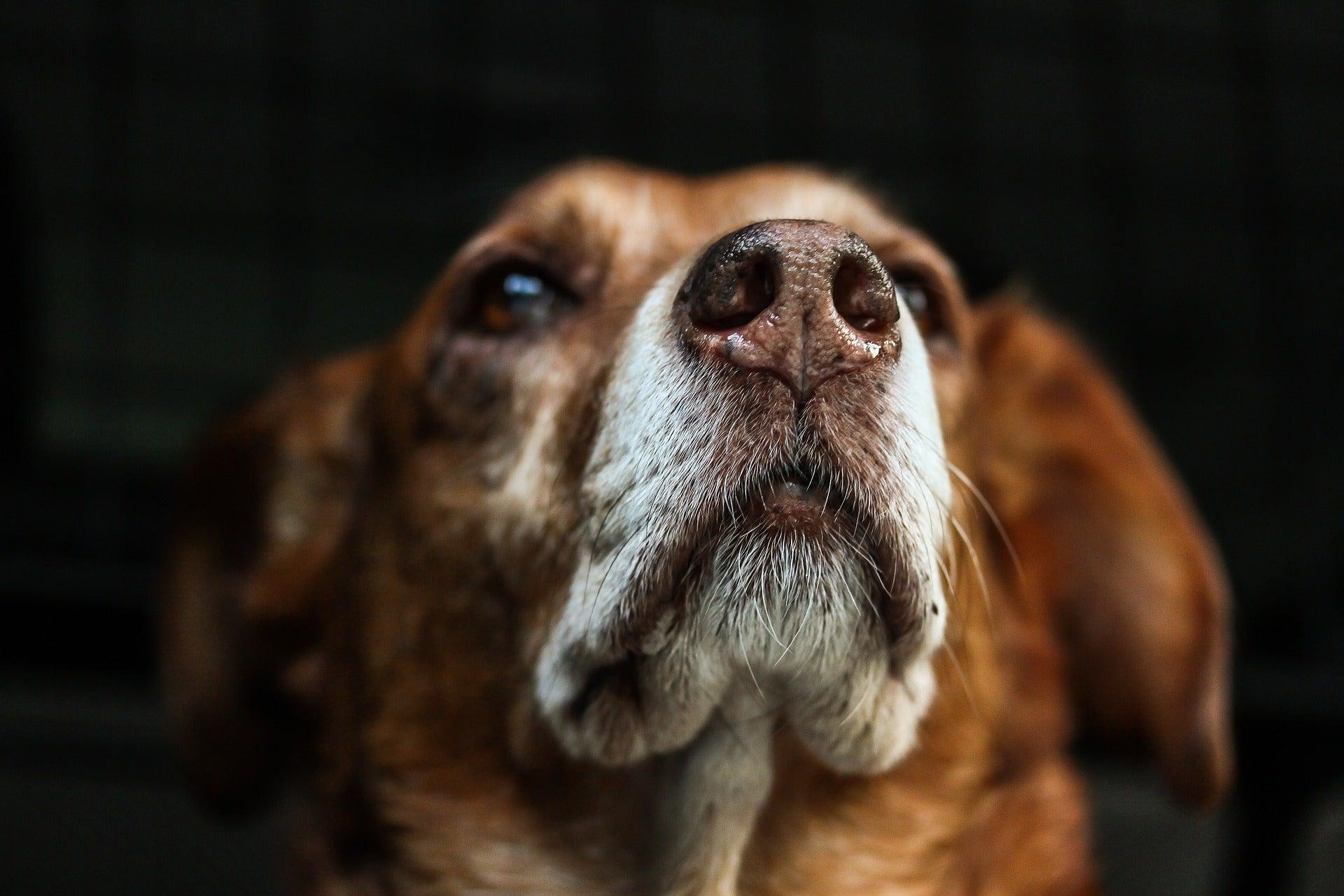In this blog, learn all about nose work dog training. What is nose work for dogs, what are the benefits and how easy is nose work dog training?
Nose Work Dog Training

Physical activity can become more difficult for dogs as they grow older. Just like us, their bodies become less agile. They may not want to jump and play as much as they used to, but that doesn’t mean they can’t be stimulated by other activities!
Mental and physical exercise are great ways to keep your senior dog feeling young, and your younger dog feeling useful. And, one great way is by introducing this low impact activity, that’s suitable for every dog – nose work for dogs!
What Is Nose Work Dog Training & Who’s It For?

Nose work is pretty much what it says on the tin! A dog does some work, using their nose. Of course, we don’t mean boring and arduous work, but it’s an activity that has a goal at the end of it to keep your pup’s mind and body engaged.
Nose work training is often carried out for dogs that are going to become working dogs, such as for border control and police dogs, for example. They’re taught to sniff out certain items all the time. The breeds that are often employed for such roles are German Shepherds, Labradors, and Bloodhounds.
But that doesn’t mean not every breed can do it! Nose work can be done by any dog with a nose – and giving them the opportunity to use it will not only be fun, but they will thrive on working well and earning praise! Did you know, a dog’s sense of smell is their strongest sense? And is 100,000 times stronger than ours! Using a natural instinct to complete a task will be easy to learn, yet very rewarding.
And as for age? Well, we think that nose work can be carried out by not only younger dogs, but it is a fantastic alternative to the hard, physical training we like to teach our pups, such as obstacle courses. So if you’re looking for ways to stimulate your older dog’s mind and body, try this out!
How To Teach Nose Work For Dogs

Luckily, most dogs like to sniff things. And, nose work for dogs is very versatile – it’s a great activity to do indoors or outdoors, and you don’t need much to get started.
It’s best to start somewhere familiar so that visually, your dog knows where they’re going. This will let their sense of smell guide them to what they’re searching for, without the extra distraction.
You have a choice of what you hide. You can choose a toy or treat that your pooch loves. This will start off the motivation to find the item, and it will be a familiar smell. Or, you can use a rare treat, such as a slice of meat – the enticing scent of less usual treats may help guide them to the hiding place with more enthusiasm.
Here are a couple of examples on how to get started with nose work. Remember, you can use anything and anywhere you want for these games.
Hide It In Your Hands
This is the easiest way to teach your furry friend to use their nose instead of their eyes. Behind your back, hide a small treat, (or cut up a treat so pieces fit in your hand), and hide it in one hand. Your dog will have to sniff both hands and point to the one that holds the treats.
If your dog chooses the wrong hand, just simply open both hands to show them where the treat was. Don’t feed them the treat if they didn’t get it right, but do the task again. When they do get it right, pass them the treat and give them some praise! This will ingrain in them what needs to be done in order to be rewarded.
Hide It Around The House
This might require a bit more patience and previous knowledge of a command such as “find it”. It’s best to begin teaching this game using a very smelly item… But, only one you’re comfortable with. For example, popcorn could work. Let your pup see and smell what you’re about to hide, before you hide it, just so they know what they’re searching for.
Now choose a corner of the room to hide the object, and then let your dog descend on their hunt. It may be difficult at first, and they may become frustrated. If so, keep encouraging them by praising them when they’re near it, and when they do find it, go wild! Let them know that they’ve completed the task, and they’ll feel fulfilled that they’ve done their job.
Why Should You Try Nose Work Dog Training?

Training dogs to do nose work as a leisurely activity, rather than a professional one is a new phenomenon, but it has a number of benefits! Here are some reasons why you should think about training your dog to get nosing around.
Mental Stimulation
Sniffing is how dogs learn about the world. So, smelling things are automatically going to stimulate their minds. Giving them something particular to locate is a job in itself – they’ll need to acknowledge and recognize items, often without the visual interpretation of the hidden object.
Confidence Building
Learning any new trick or game can build your dog’s confidence because they are being taught that what they do is the right thing to do! Without fear of being scolded, dogs will roam more freely and enjoy what they’re doing.
Reinforcing good behavior with praise is key to the training. Once your dog is comfortable in knowing their actions are not wrong, they’ll be more likely to be themselves! As sniffing things is natural to dogs, their new-found confidence will give them the courage to approach new objects and people, and give it a good sniff, without cowering away.
An Outlet For Hyperactivity
Simply giving your dog something to do is going to distract them – and this is particularly good for hyper dogs, or dogs that struggle to behave all the time. They’ll be able to apply their energy to a task that they can do by themselves, and one that can be entertaining!
Tasks such as nose work for dogs will help tire them out too, so if you’re looking for an easy way to exhaust them, this can be a great tool in your arsenal!
Helps Dogs With Hearing Loss Or Sight Loss
For pooches that have eyesight or hearing problems, this is a game that they can learn, too. Being able to use their nose for something will give them the opportunity to be fully involved, and not worry about what they can’t do. Be sensitive to what they may struggle with, so offer praise whichever way they can sense it most.
Great For Bonding
Any type of training and playing will benefit the relationship between you and your dog. And nose work for dogs is no different – the praise they receive from you while they learn to find things for you will bring you two closer together.
Nose Work Dog Training: Our Final Thoughts

Nose work for dogs is an easy to learn activity for you and your pup, and because it uses their strongest sense, it’s one that they’re bound to be good at!
And, as you probably know, being good at something usually fills you with joy. So, if you’re looking for a new way to stimulate your dog – especially if they’re getting a bit older and less active – nose work dog training is a great tool to get them using their mind and body.
Sources
“8 Dog Nose Facts You Probably Didn’t Know” Pet MD, May 28. 2020 https://www.petmd.com/dog/behavior/5-dog-nose-facts-you-probably-didnt-know
 C
C



